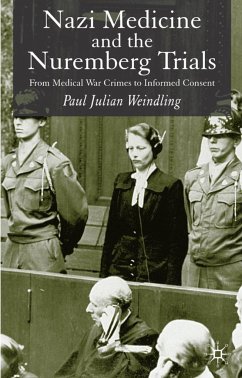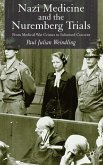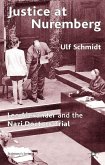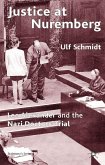This book offers a radically new and definitive reappraisal of Allied responses to Nazi human experiments and the origins of informed consent. It places the victims and Allied Medical Intelligence officers at centre stage, while providing a full reconstruction of policies on war crimes and trials related to Nazi medical atrocities and genocide.
'A multifaceted account of the Nuremberg Medical Trial, one that combines a number of theoretical perspectives and is receptive to both the historical context and the personal narrative of those involved. The book is cogently argued and presents a thoroughly informed analysis of the relationship between German medicine, on one hand, and Nazi racial and social policies during the Second World War, on the other.' - Journal of the History of Medicine and the Allied Sciences
'Nazi Medicine and the Nuremberg Trials provides ample evidence of what can happen, even in a developed country, when democratic norms and institutions are subverted.' - Journal of the American Medical Association
'Prodigiously researched...the book offers valuable insights into the dynamics of the Trial and, more generally, the vulnerability of ethics to the demands of scientific progress.' - Social History of Medicine
'A masterly volume' - The Lancet
'Is there anything left to say about the trial of the Nazi doctors at Nuremberg? Weindling's book provides abundant proof that there is. Indeed, there is so much new information in this book, almost all of it derived from primary sources, that the history of this pivotal moment in the ethics of research with human subjects seems to have been reborn with its publication. Not a page is wasted in this packed, efficiently narrated account. Weindling delivers surprise after surprise, correcting and redirecting the accumulated impression we have inherited of what the Nazi doctors did, why they did it, and how the doctors were judged. Few readers will finish the book with their preconceptions intact. ' - Professor Daniel Wikler, Harvard School of Public Health, University of Harvard
'A multifaceted account of the Nuremberg Medical Trial, one that combines a number of theoretical perspectives and is receptive to both the historical context and the personal narrative of those involved. The book is cogently argued and presents a thoroughly informed analysis of the relationship between German medicine, on one hand, and Nazi racial and social policies during the Second World War, on the other.' - Journal of the History of Medicine and the Allied Sciences
'Nazi Medicine and the Nuremberg Trials provides ample evidence of what can happen, even in a developed country, when democratic norms and institutions are subverted.' - Journal of the American Medical Association
'This book represents a major piece of new research, carefully investigating the structures and actors that gave rise to the atrocities of Nazi medicine, as well as documenting the difficulties of prosecuting such crimes and the continuing problems arising from human experimentation and the (political) limits of medicine...a work of immense importance, dealing competently and even-handedly with the darkest aspects of the 'dialectic of Englightenment.' - Rene Wolf, Patterns of Prejudice, Vol 40, 4-5, 2006
'Nazi Medicine and the Nuremberg Trials provides ample evidence of what can happen, even in a developed country, when democratic norms and institutions are subverted.' - Journal of the American Medical Association
'Prodigiously researched...the book offers valuable insights into the dynamics of the Trial and, more generally, the vulnerability of ethics to the demands of scientific progress.' - Social History of Medicine
'A masterly volume' - The Lancet
'Is there anything left to say about the trial of the Nazi doctors at Nuremberg? Weindling's book provides abundant proof that there is. Indeed, there is so much new information in this book, almost all of it derived from primary sources, that the history of this pivotal moment in the ethics of research with human subjects seems to have been reborn with its publication. Not a page is wasted in this packed, efficiently narrated account. Weindling delivers surprise after surprise, correcting and redirecting the accumulated impression we have inherited of what the Nazi doctors did, why they did it, and how the doctors were judged. Few readers will finish the book with their preconceptions intact. ' - Professor Daniel Wikler, Harvard School of Public Health, University of Harvard
'A multifaceted account of the Nuremberg Medical Trial, one that combines a number of theoretical perspectives and is receptive to both the historical context and the personal narrative of those involved. The book is cogently argued and presents a thoroughly informed analysis of the relationship between German medicine, on one hand, and Nazi racial and social policies during the Second World War, on the other.' - Journal of the History of Medicine and the Allied Sciences
'Nazi Medicine and the Nuremberg Trials provides ample evidence of what can happen, even in a developed country, when democratic norms and institutions are subverted.' - Journal of the American Medical Association
'This book represents a major piece of new research, carefully investigating the structures and actors that gave rise to the atrocities of Nazi medicine, as well as documenting the difficulties of prosecuting such crimes and the continuing problems arising from human experimentation and the (political) limits of medicine...a work of immense importance, dealing competently and even-handedly with the darkest aspects of the 'dialectic of Englightenment.' - Rene Wolf, Patterns of Prejudice, Vol 40, 4-5, 2006








